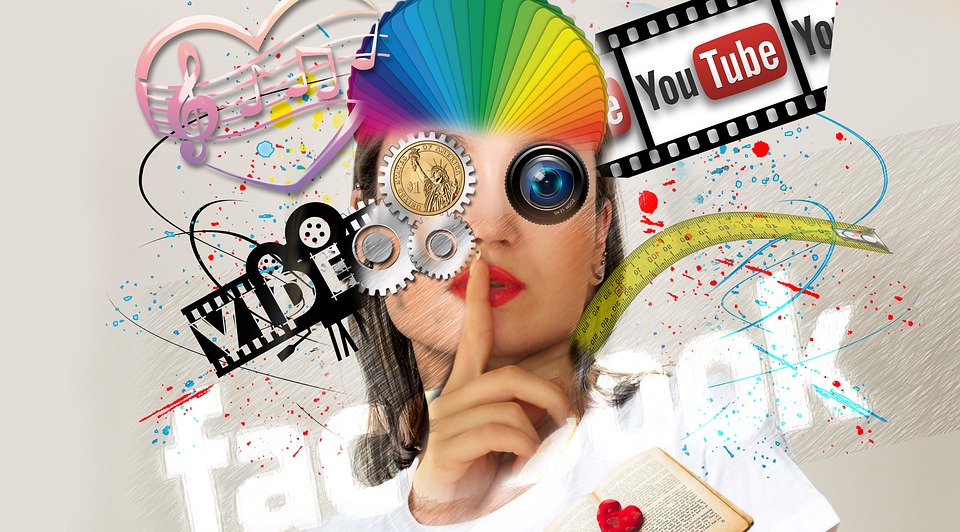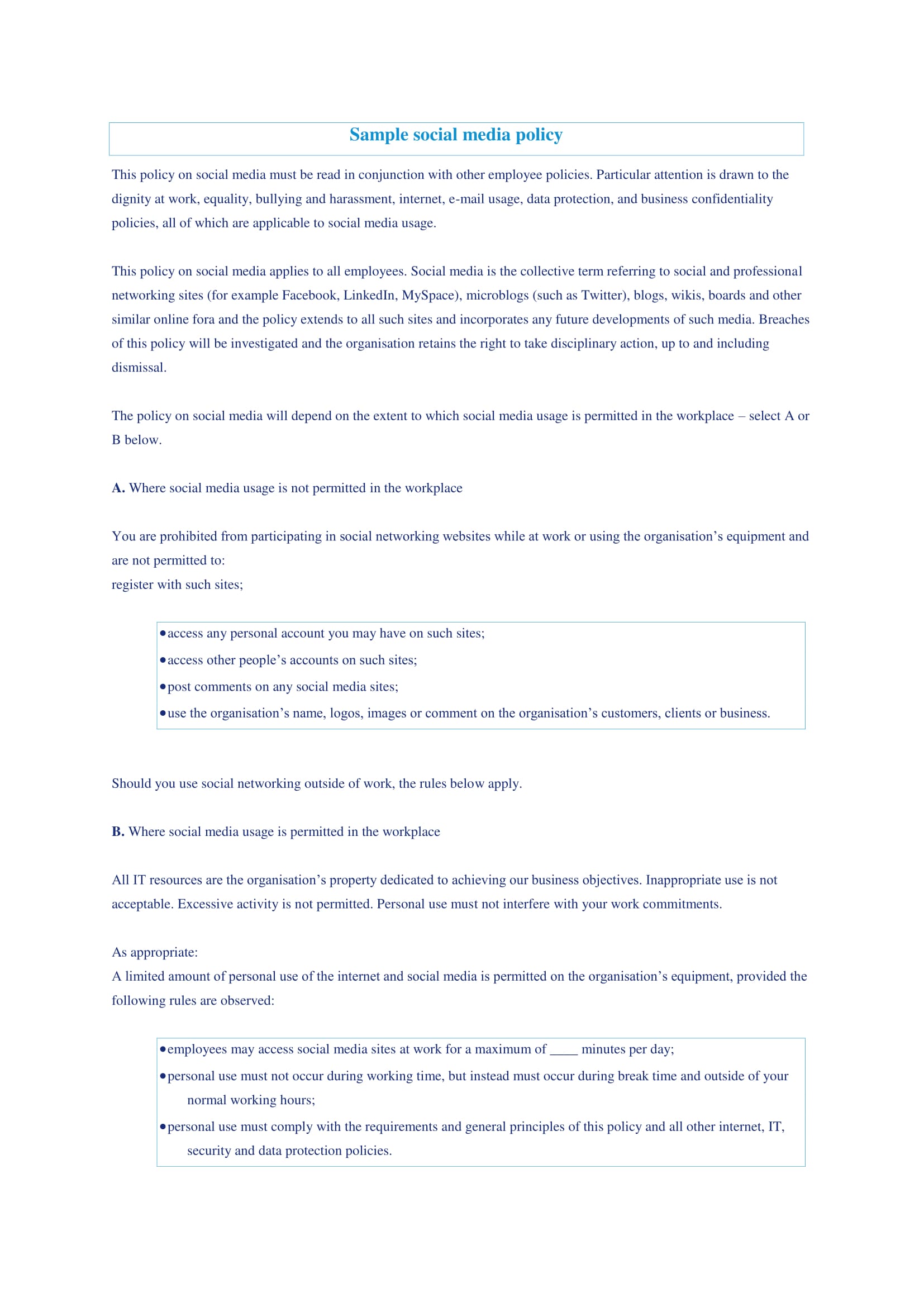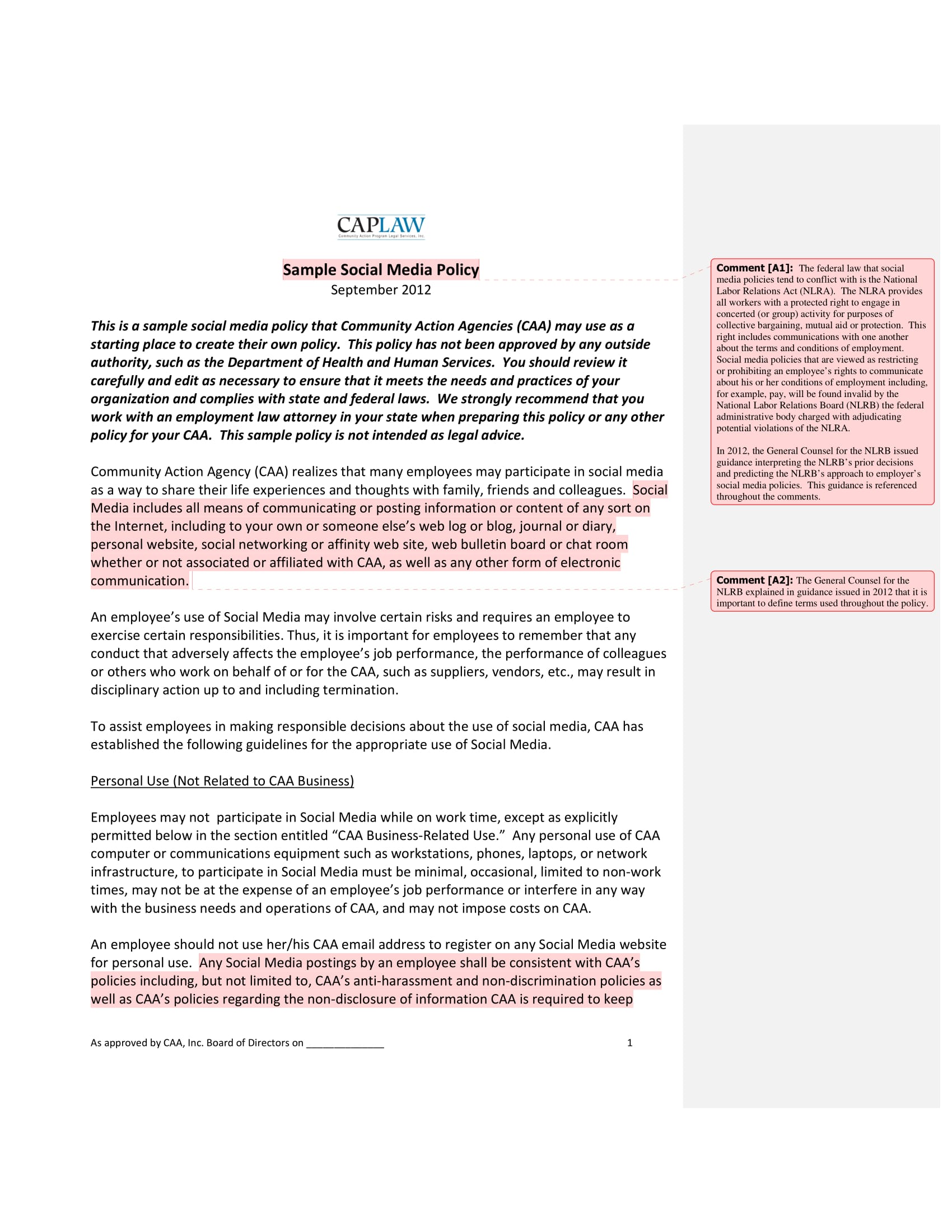13+ Social Media Policy Examples
In this age that we are currently in, it cannot be denied that social media plays a big role. For some of us, as early as waking up, the first thing we do is check up on our daily dose of social accounts to see if there were notifications while we were sleeping or if there were interesting things that happened overnight. It’s as if we have become attached and almost dependent on our social accounts that it’s also as if we cannot any more live without it.

Socialization is just one of the aspects of our lives but it has affected the other aspects of our lives particularly our lives. We may deny and say that social media does not have any have an effect on our performance and productivity at work. News flash: it does. That is why there is a need to develop a social media policy in the workplace. This not to kill the ‘fun’ but this actually to kill the possibility of being unproductive and the bad performance that may happen in our workplace and that may affect our work.
Social Media Policy
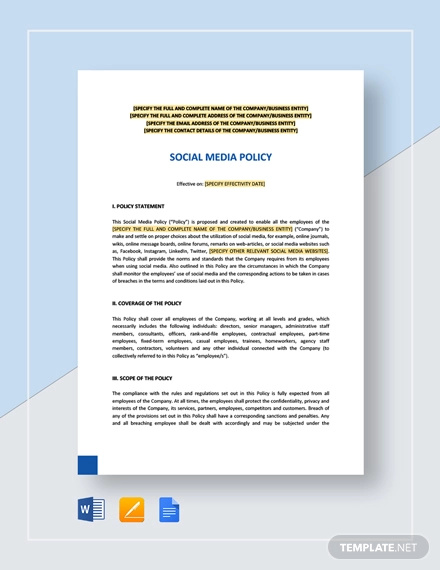
Social Media Policy Templates for Restaurant
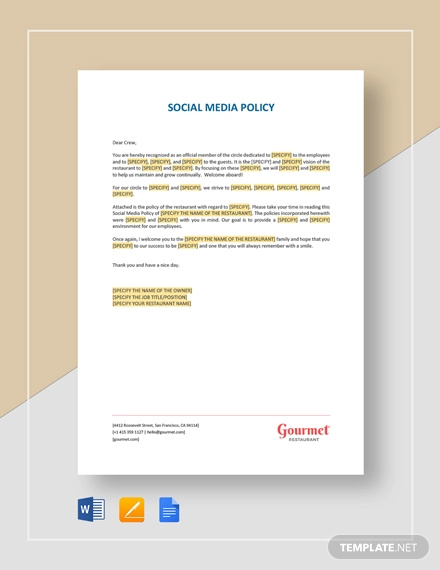
Sample Social Media Policy
Community Action Agencies Social Media Policy
Beachcroft Social Media Policy Template
What Is Social Media Policy?
A social media policy, also called as a social networking policy, is a comprehensive document that simply outlines how employees should act accordingly on social media. Through these policy examples, both employers and employees would have guidelines to follow in order to avoid any risks that will spring from careless and unguided acts and to be more responsible on social media.
Every social media policy has two goals: one is for employers to set guidelines to their employees on how they should conduct themselves when being active on their social media accounts, and two, is to protect the employers from potential harm that a social media related issue that might arise.
In a simple and general sense, social media policies consist of the dos and don’ts when they engage themselves on any social media sites. It also consists of the repercussions whenever they would violate any policy or fail to be responsible enough for what they have signed up for.
Social Media Policy for Employees and Contractors
Sample Social Media Policy
Social Media Acceptable Use Policy
Why We Need Social Media Policies
Even if there are companies out there that have long been established and may claim that their company has been standing for many years without the need for social media policies, there is really a need for one. Even if the rate of employees posting various offensive images and posts on their social media accounts does not yet reach the alarming stage, the best thing we can do is to avoid that to happen. Even if there are only a few cases of employees posting undesirable posts online, one must take note that social media will be here for a long time and since it does, chances of social media related problems would continue to arise.
Here are three, solid reasons for each party—employees and employers—need to have an implementation of social media policies.
On the Employer’s End:
Social media policies protect the company’s image. Social media policies regulate their employees on their online presence. Even the mere lewd profile photo of an employee on Facebook can ruin the image of the company he or she is employed at, and with social media policies, employers have the authority to tell off his employee to put down the photo and do other necessary actions as consequence to his or her violation.
Social media policies manage and regulate the employees’ conduct. Some employees might think their personal lies are being meddled with when the management interferes on whatever their opinions are regarding about the company they are currently employed at. But with social media policies, the employer can legally restrict them from being illicit behaviors while being on their social media accounts.
Social media policies minimize liability when for whatever their employees would say or do or act on social media. There are some employees and customers who would post on their social media accounts that may include of threats, hateful commentaries, discrimination, and other illicit acts and behaviors that may lead to legal actions since there are other third parties that would be affected. With social media policies, the management or the employer would have a liability exclusion clause which enables them to have the exclusion of liability clauses in social media policies. This means that their responsibility towards whatever irresponsible acts of their employees on their social media accounts would be lessened or limited.
On the Employee’s End:
Social media policies would increase and improve productivity. While this benefit may also benefit the employer, productivity is mostly beneficial for the employees since they will also be positively affected by it.
Take for example this scenario: Employee A checks up on his social media accounts every hour while Employee B only checks up on his social media accounts before and after duty hours or only during his hour break. Employee A has the tendency to take up more than an hour scrolling through his social networking sites while Employee B would be consistent with doing his tasks and responsibilities. Who do you think who will have more work done?
Naturally, Employee B would have done more work done Employee A. And aside from that, Employer B would have lesser things to worry about while Employee A, since he has wasted his time checking up on his social media accounts, would have an unnecessary pile of pending work. Social media policies would also enable that blocking of social media websites so that they can have firsthand control over their employee’s activity at work. Any good performing employee would always reap the results of his good performance.
Social media policies enforce responsible social media usage and educate employees. While employers can regulate the conduct of their employees while at work, it will be difficult to supervise them when they are not at work. But with a well-enforced and implemented social media policies, employees would grow out a habit of being a responsible social media user. This will not only help them at work but this will also improve their maturity and personal development.
They will realize that instead of posting their complaints about their workmates on their current job, they will directly address their concerns to their human resource management instead of talking about it on one of their social media accounts where the audience would not even care are not even related to whatever complaints or concerns they have. A good social media policy, such as giving the employees a medium where they can freely address their concerns directly to the concerned people, would help them prefer a direct solution to their problems rather than taking refuge on social media. Employees would also have a habit that would make them “think before they click”.
School Social Media Policy
Global Social Media Policy
Target Social Media Policy
Purpose of Social Media Policies
Every document in a company has a purpose. Just like with social media policies, it has a purpose which is to regulate the employees when they use the various social networking websites like Facebook, Twitter, Instagram, and even personal blogs are included. This gives the employees the sense of responsibility in whatever they do or say on the internet that may cause risks and complications to the image and reputation of the company they are currently employed at. Even if employees would be posting personal and non-work-related posts or images on the internet but as long as its violating the policies set by the company, the employer can still regulate their actions.
Enterprise Social Media Policy
Department of Social Services Social Media Policy
Policy on Employee Use of Social Media
This not only to protect the employer or the company but also it will also limit the employee from committing unnecessary actions and also protect the employee from any possible litigations as result of their illicit acts online. Some may say that this limits the freedom of expression but the fact is that these social media policies also make them a responsible media user. Even if freedom of expression exists, we must also keep in mind that freedom has limitations and that freedom is not an opportunity to do any harmful and illicit acts on both digital and real worlds.


